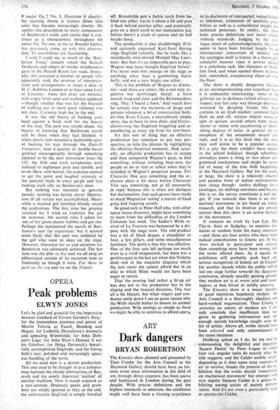OPERA
Peak problems
ELWYN JONES
Let's be glad and grateful for the impressive musical standard of Covent Garden's Ring: for the tremendous presence and power of Martin Talvela as Fasolt, Hunding and Hagen; for Ludmilla Dvorakova's dramatic and appealing Briinnhilde; for John Dot), son's Loge; for John Shaw's Donner if not his Giinther, for Helga Dernesch's beauti- fully accomplished Sieglinde; and for Georg SoIti's taut, polished and increasingly spacit ous handling of the score.
Al we need now is a decent productions This one used to be thought of as a comprc:H mise between the cloudy abstractions of Bay- reuth and the overly theatrical `realism' of another tradition. Now it stands exposed as a non-attempt. Dramatic peaks and prob4 lems are simply ignored so that, at the end, the unfortunate Siegfried is simply bundled off; Briinnhilde gets a feeble torch from be- hind one pillar, waves it about a bit and puts it back behind another pillar, and eventually goes on a short stroll to her immolation just before there's a crash of canvas and no hell breaks loose.
The production is also shudderingly ill-lit and curiously costumed. Karl-Josef Hering sings Siegfried valiantly, but he looks like a metallically mini-skirted Micheal Mac Liam- mak. But then it's an impossible part to play. Wagner may have thought Siegfried `heroic', I've never seen him emerge on the stage as anything other than a gambolling butch bully, and not a very bright one either.
This is the problem of Wagner as drama- tist—and there are others. He is not only re- petitive but terrifyingly literal: a horn sounds loud and clear and the Rhinemaidens sing, `Hey. I heard a horn.' And watch how he retreats into the mysteries of drugs and potions whenever a bit of construction both- ers him. Even Tristan, a marvelously simple story, has to have its love elixir, and Goner- diimmerung has Siegfried forgetting and re- membering at every sip from his cow-horn.
It's this sort of thing that an effective production has somehow to put into per- spective, to hide the idiocies by highlighting the effective theatrical moments. And, cruci- ally, an effective production has to accept and then compound Wagner's pace, to find something, without irritating busy-ness, for people to do or feel or reflect when they're stranded in Wagner's perpetual pauses. For Character One says something and the or- chestra plays a lot more before Character Two says something, not at all necessarily in reply because this is often not dialogue, but declamation. Just such pauses have made so much Wagnerian `acting' a matter of fixed grins and lingering scowls.
So good luck to Peter Hall who, with other opera house directors, might have something to learn from the difficulties at the London Coliseum last week. The Sadler's Wells re- vival of La Traviata was hampered by a dis- pute with the stage crew. The end-product was a lot of black drapes, a chandelier or four, a few pillars, and some miscellaneous furniture. The point is that this was effective. One of the four acts left perhaps too much even to a vivid imagination, but there was a positive gain in the last act when this Violetta died—not in the -exquisite elegance which the text states she cannot afford but in an attic to which Mimi would not have been eager to return.
That' the evening had rather a fit-up air was due not to the production but to the singing and the musical direction. This was all a bit blatant, but when singers and con, ductor settle down I see no great reason why the Wells should bother to mount its normal production. With settings as simple as these we might be able to continue to afford opera',






































 Previous page
Previous page